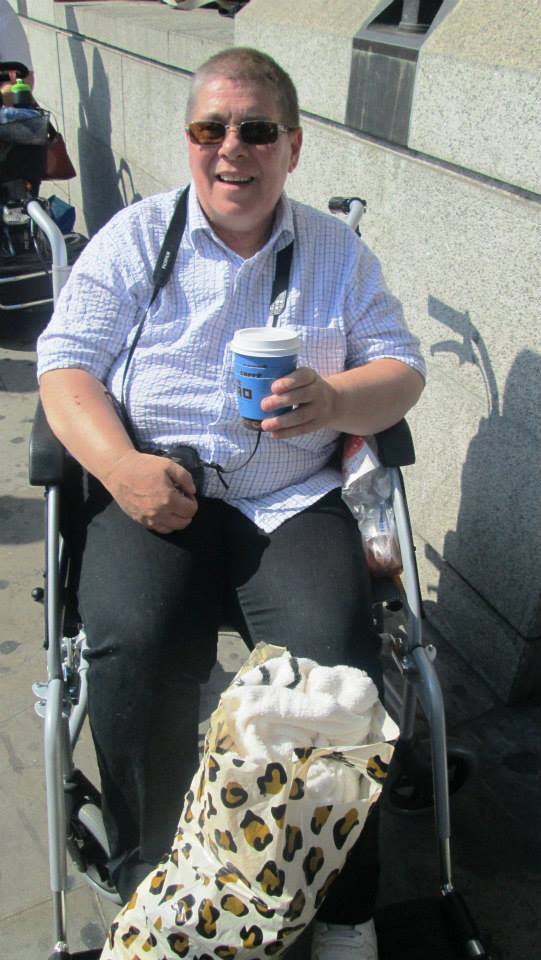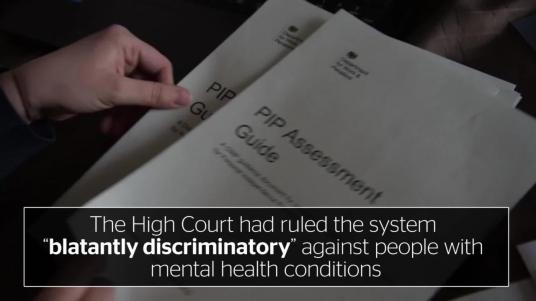
Errol Graham, who starved to death in 2018, following his social security support being cancelled by the Department for Work and Pensions. He left a heartbreaking letter which described his circumstances leading up to his death. His family found the letter after he died, weighing less than five stone.
Department for Work and pensions (DWP) officials have admitted that up to 50 reviews into deaths following harsh social security cuts and sanctions have been destroyed.
The government has been accused of a ‘cover-up’ after destroying the reports which link suicides to sanctions and peoples’ benefits being stopped. Around 50 reviews into deaths following the loss of social security payments before 2015 have been shredded, officials have blamed data protection laws.
However, the data watchdog has said there was absolutely no requirement to destroy the reports by any particular date and that a “public interest” exemption could have been used.
The Department would have known that.
Labour MP Stephen Timms, the chairman of the Commons work and pensions committee, agreed it was a possible cover-up, saying: “I’m very sympathetic with that”
Timms, who said his committee would demand answers about the shredded reports, pointed out a scathing National Audit Office report (NAO) had warned the DWP was unable to show it was learning lessons.
Having been “very secretive”, it was now “very reluctantly” becoming more open, he said – but “trying to keep things as hush-hush as possible – and it’s not good enough”.
“It all underlines a lack of seriousness by the department about putting things right when they go wrong.”
The NAO investigation into the information DWP collects on deaths by suicide of social security claimants found that the department has internally reviewed 69 cases in which “alleged department activity” may have been among the reasons for such death. However, it said ‘gaps in reporting’ meant the actual figure was likely to be higher. The report said said the department did not seek to draw trends from the findings of internal reviews, meaning that “systemic issues which might be brought to light through these reviews could be missed.”
The government seems determined not to adequately monitor or to learn lessons from the adverse impacts of their draconian policies.
Timms added: “The law does not specify five years or six years and this kind of information should be held for longer,” in response to the DWP’s claim that data rules required the destruction of old investigations.
“In any case, the lessons learned from these reviews, there’s no reason why they should be destroyed. They should be kept and progress on implementing improvements monitored.”
A freedom of information (FoI) response to a campaigner revealed that up to 49 secret reviews carried out before 2015 were destroyed.
More than 100 have taken place over the last decade, amid growing concern over deaths linked to harsh benefit cuts and sanctions introduced by the Conservatives.
Labour MP Debbie Abrahams fought back tears in the Commons as she read out a list of 24 people who died after problems with their benefits, this week.
Regarding the 69 reviews since 2015, she told ministers: “This is just the tip of the iceberg. We do not even know the actual number of people who have taken their own life as a result of what they went through.”
In a statement, the DWP said: “We take these reviews extremely seriously and ensure cases are investigated and concluded and any lessons learned.”
However, that is clearly untrue. In fact the department and government ministers have consistently denied a ‘causal link’ between their policies and an increasing mortality rate, while also refusing to allow an independent investigation into the deaths.
The NAO criticised the DWP for lacking clear guidance on when a case should be investigated and for not having any “robust record” of contact from coroners about suicide cases, which it said meant some cases flagged up by coroners may not have resulted in an internal review being initiated.
It’s worse than disgraceful that people are dying because of draconian policies and the actions of a system that should be supporting them.
Many of us have called for the DWP to be held accountable through robust independent inquiry and regulation. The department has shown a consistent lack of transparency when reporting on systematic problems that have put people at risk, and has refused to open itself up to meaningful independent scrutiny.
Earlier this month, I reported that the DWP has been accused of altering disability assessment reports, to reduce or end peoples’ lifeline support. It was alleged that officials within the Department for Work and Pensions (DWP) have edited or entirely removed thousands of work capability assessment reports submitted by privately contracted ‘independent’ healthcare professionals. This is another indication of the complete lack of transparency around DWP decision making.
The consequences of this government’s draconian social security policies
Many people have died since the welfare ‘reforms’ were hammered through parliament, despite wide opposition.
Relatives of a man who starved to death after his social security was cut are taking legal action against the DWP.
Errol Graham’s family said they hoped the case would overhaul the system “to better protect vulnerable claimants”.
Errol’s daughter-in-law Alison Turner has sent a pre-action protocol letter to the DWP, arguing the termination of benefits for someone in Mr Graham’s circumstances were unlawful.
She also argues secretive investigations and reviews being conducted by the DWP into benefit-related deaths are unlawful and must be reformed.
Errol Graham weighed just four-and-a-half stone when his body was found by bailiffs who had knocked down his front door to evict him. He had just a couple of out-of-date tins of fish left in his flat, because the DWP had wrongly stopped his ESA. He starved to death, and his rent support had been stopped as a consequence of his ESA claim being ended. The DWP failed to follow safeguarding rules in their haste to end his claim. He was also denied PIP, which left him without any income whatsoever.
DWP civil servants had failed to seek further medical evidence from his GP, just as in many other tragic cases that have sparked repeated calls for an independent inquiry into links between the deaths of claimants and the actions and failings of the DWP. The government have consistently refused to acknowledge a correlation between their actions and the death of disabled people, so have no intention of investigating the evidence.
Assistant coroner Dr Elizabeth Didcock, who heard the inquest, was told that the DWP stopped Graham’s ESA entitlement – and backdated that decision to the previous month – after making two unsuccessful visits to his home to ask why he had not attended a face-to-face work capability assessment (WCA) on 31 August 2017. The inquest heard that it was standard DWP procedure to go ahead with stopping the benefits of a claimant marked on the system as vulnerable after two failed safeguarding visits.
However, the DWP (somehow) managed to stop an ESA payment that had been due to be credited to his bank account on 17 October, the same day officials made the second unsuccessful safeguarding visit.
DWP’s own rules state that it should make both safeguarding visits before stopping the benefits of a vulnerable claimant.
Because Errol lost his ESA entitlement, his housing benefit was also stopped. His family says he had also been found ineligible for PIP. Deprived of all financial support, experiencing significant mental distress and unable or unwilling to seek help, he slowly starved to death. He was 57. His body was discovered on 20 June 2018 when bailiffs arrived at his Nottingham council flat to evict him for non-payment of rent.
His benefits had been stopped even though he had been receiving incapacity benefit, and then ESA, for many years as a result of enduring mental illness and distress that had led to him being sectioned. Errol was clearly extremely vulnerable.
He had also told the DWP on an ESA form three years earlier that he could not cope with “unexpected changes”, adding: “Upsets my life completely. Feel under threat and upset…”
He added: “Cannot deal with social situations. Keep myself to myself. Do not engage with strangers. Have no social life. Feel anxiety and panic in new situations.”
The assistant coroner said: “There simply is not sufficient evidence as to how he was functioning, however, it is likely that his mental health was poor at this time – he does not appear to be having contact with other people, and he did not seek help from his GP or support agencies as he had done previously.”
She concluded in the narrative verdict, delivered last June, that the “safety net that should surround vulnerable people like Errol in our society had holes within it”.
Those ‘holes’ are a consequence of deliberate, ideologically driven anti-welfare policies. They have intended consequences. The government assumes that people treated unfairly will appeal wrong decisions. Firstly, many people are far too ill to cope with the stress of that process. Secondly, it should never be primarily the role of courts to allocate social security fairly. That is the official role and purpose of the DWP. However, the government department is clearly failing to fulfil its role. This is because the neoliberal ideology that drives austerity policies is incompatible with the central principles of social security.
She continued: “He needed the DWP to obtain more evidence [from his GP] at the time his ESA was stopped, to make a more informed decision about him, particularly following the failed safeguarding visits.”
She said that a consultant psychiatrist had told the inquest “that Errol was vulnerable to life stressors” and that it was “likely that this loss of income, and housing, were the final and devastating stressors, that had a significant effect on his mental health”.
But she decided not to write a regulation 28 report demanding changes to DWP’s safeguarding procedures to “prevent future deaths” because the department insisted that it was already completing a review of its safeguarding, which was supposed to finish last autumn.
The DWP had promised her it would “listen to clients and to those representing them, and… ensure that the DWP was focused on support and safety for vulnerable people”.
Dr Didcock insisted that this commitment “must be converted into robust policy and guidance for DWP staff” and that the DWP must ensure that “all evidence that can reasonably be gathered is put together about a client, before a benefit is ceased”.
Disability News Service also highlights that the death of Errol Graham closely mirrors other tragedies caused by the DWP’s repeated refusal to make significant improvements to its safeguarding policies and practices.
Denise McKenna, co-founder of the Mental Health Resistance Network (MHRN), said the network was “absolutely devastated and saddened beyond words to hear of the circumstances surrounding the death of Mr Graham”.
She said: “We are enraged that the DWP continues to treat the lives of people who live with mental distress as disposable.
“This level of cruelty is outside of anything that would happen in a civilised society.
“The fact that Mr Graham had not responded to attempts to contact him following his failure to attend the work capability assessment (WCA) should have raised alarm bells over his safety, but instead the DWP took the opportunity to stop his social security entitlements.”
And there’s the truth: the government have created a hostile environment for disabled people that is heavily weighted towards preventing successful claims, taking its lessons from rogue multinational insurance companies such as Unum, who have systematically employed strategies to pay out insurance only as the last resort, rather than on the basis of need.
Furthermore, the DWP and Conservative ministers have consistently demonstrated a refusal to acknowledge the widespread distress, harm and death that their policies are causing, despite many challenges to their narrative of denial. Nor is it likely the government will address the complete lack of honesty, transparency and accountability operating at the centre of the DWP, of their own volition.
The government’s indifference and lack of remorse related to the clear correlation between policy and increased mortality is extremely worrying.
That is why we must continue to campaign, raise awareness and stand up for ill, disabled and vulnerable citizens in the UK.

Errol Graham’s letter, which was released through his daughter-in-law’s lawyers, Leigh Day , is a moving window into the world of someone with severe mental illness trying to cope with the hostile environment imposed on vulnerable citizens because of government policies. (Picture from the Mirror).
More people, like you, are reading and supporting independent, investigative and in particular, public interest journalism, than ever before.
I don’t make any money from my research and writing, and want to ensure my work remains accessible to all.
I have engaged with the most critical issues of our time – from the often devastating impact of almost a decade of Conservative policies and growing, widespread inequality to the influence of big tech on our lives. At a time when factual information is a necessity, I believe that each of us, around the world, deserves access to accurate reporting with integrity and the norms of democracy at its heart.
My work is absolutely free from commercial and political interference and not influenced one iota by billionaire media barons. I have worked hard to give a voice to those less heard, I have explored where others turn away, and always rigorously challenge those in power, holding them to account.
I hope you will consider supporting me today, or whenever you can. As independent writers, we will all need your support to keep delivering quality research and journalism that’s open and independent.
Every reader’s contribution, however big or small, is so valuable and helps keep me going. Thanks.















